Boiling Point: Trump is lying about California and clean energy again

I don’t spend much time writing about former President Trump, or the Republican Party, more broadly.
Here in California, Democrats rule the political roost, and they’ve made fighting the climate crisis a top priority. They’re not doing nearly enough, and climate activists have criticized some of their decisions as counterproductive or unintentionally harmful. Even so, the debate is all about how we should be working to confront climate change, not whether we should be doing so.
But the Golden State can’t solve a global crisis on its own. We need the rest of the world to follow our lead on ditching fossil fuels and slashing carbon pollution — and there’s arguably no bigger obstacle to that happening than the U.S. Republican Party.
Trump offered a potent reminder of that reality during a campaign speech in Houston last week.
To persuade voters to send him back to the White House, the former president offered a series of lies and exaggerations on clean energy. Trump suggested President Biden has adopted an “electric vehicle mandate” and “blocked oil and gas leasing in America.” (Biden has proposed rules that could require two-thirds of new cars to be electric by 2032, and has continued leasing public lands for fossil fuel drilling despite campaigning on a promise to stop.) He claimed Biden is pushing “suicide power-plant regulations that will shut down every oil- and gas- and coal-fired power plant in America,” which is also far from the truth.
Of particular relevance to California, Trump told an enthusiastic crowd that the Golden State “had blackouts all over the place this summer” because we didn’t have enough electricity to keep our air conditioners running in the sweltering heat.
“The whole thing is crazy — let’s go all electric, but we don’t have enough electric,” Trump said.
As with all the best lies, this one is based on a kernel of truth. Three years ago, small portions of the state experienced brief rolling blackouts when its biggest electric companies ran short on power over two summer evenings. There have been some close calls since then. And going forward, figuring out how to keep the lights on during heat waves worsened by fossil fuel combustion — especially after sundown, when solar panels stop generating — is a challenge policymakers are still working to solve.
But California experienced no blackouts caused by electricity shortages this summer. None. Not even during a solar eclipse.
For Trump and the vast majority of Republican Party leaders, though, facts don’t matter when it comes to clean energy. They didn’t matter during the Obama years, when climate denial was all the rage and Republicans in Congress ensured no major climate legislation could pass. They didn’t matter during the Trump administration, when “drill, baby, drill” became a GOP mantra. And they don’t matter now, when outright climate denial is relatively less common but Republicans continue to espouse pro-fossil fuel propaganda riddled with misinformation about the benefits of clean energy and the deadly harms of global warming.
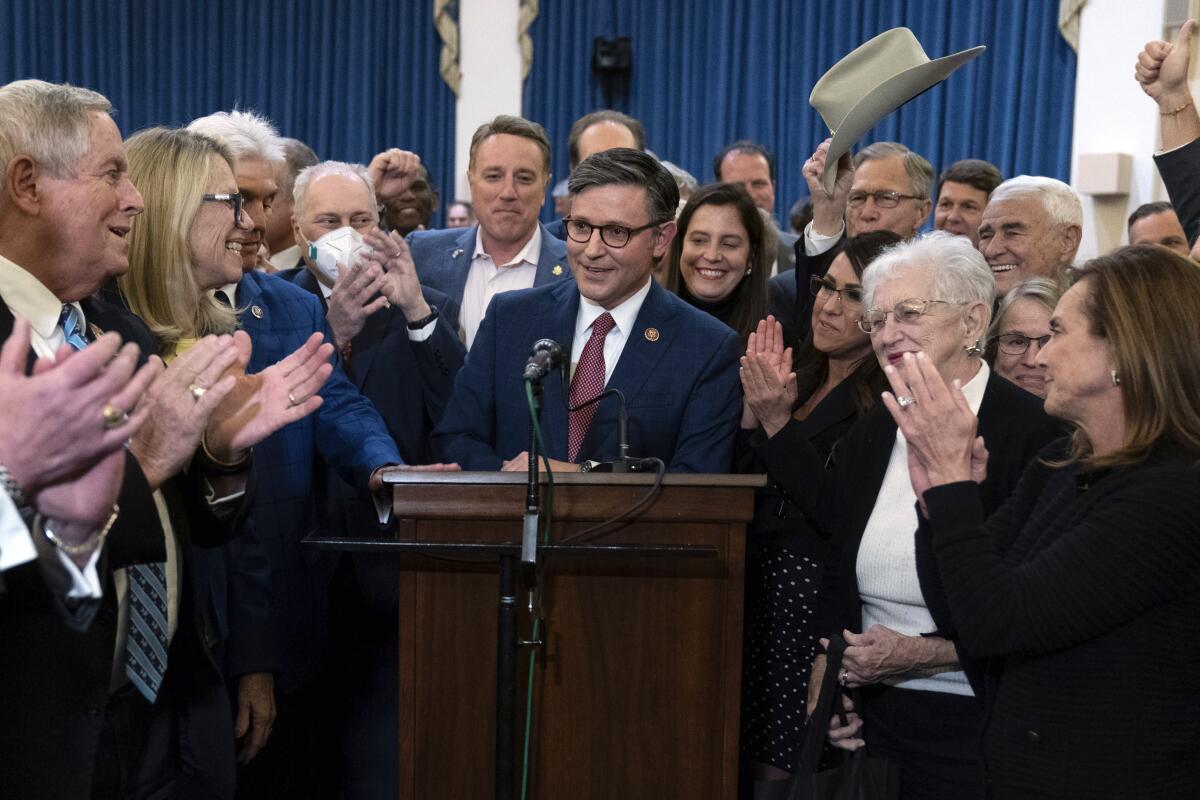
Just look to Wyoming, where the state’s Republican Party just passed a vote of “no confidence” in Gov. Mark Gordon for daring to suggest that climate change is real and Wyoming ought to do something about it. Or to Washington, D.C., where the GOP’s newly elected speaker of the House, Rep. Mike Johnson of Louisiana, once described a climate plan proposed by Democratic lawmakers as “a thinly veiled attempt to implement the policies that would usher in a new socialist society in America.”
This isn’t the first time Trump has used California’s climate policies as a punching bag. He has repeated the popular anti-clean energy lie that wind turbines cause cancer, and once said the wind turbines in and around Palm Springs make the area look like a “junkyard.” As wildfires torched the state in 2020, Trump visited and said, “It will start getting cooler, you just watch.”
During his remarks in Houston, the former president trashed the Paris climate accord, calling instead for a “Texas climate accord” — ironic given that the Lone Star State has had trouble keeping the lights on during climate-fueled extreme weather.
“We will reclaim America’s destiny as the greatest energy superpower on the face of the Earth,” Trump pledged.
As I said earlier, I don’t spend much time writing about the Republican Party. There are so many climate stories to tell here in California, so many clean energy policies to make sure we get right. If we can show it’s possible to start replacing gas plants with solar panels and wind turbines — and driving electric cars, and transitioning to electric heating and cooking — there’s at least a chance of other states and nations following suit. If we can’t, the odds of averting global calamity fall dramatically.
But there are equally low odds of avoiding a future of worsening heat storms, wildfires and droughts if the U.S. as a whole — the world’s second-largest climate polluter after China — doesn’t rapidly clean up its act. As much good stuff as there was in last year’s Inflation Reduction Act — the climate bill approved by Democrats over unified Republican opposition — it wasn’t nearly enough. Going further would be a heck of a lot easier if at least some Republican leaders could get on board.
But that seems unlikely as long as the oil and gas industry continues its heavy spending to support Republicans. The results of that spending were on display at the first Republican presidential debate this summer, when just one of the eight candidates onstage was willing to acknowledge they agree with the science showing global warming is caused by human activities.
As much as Trump’s lies might make you squirm, he’s the symptom, not the disease.
On that note, let’s get back to our usual programming. Here’s what’s happening around the West:
TOP STORIES
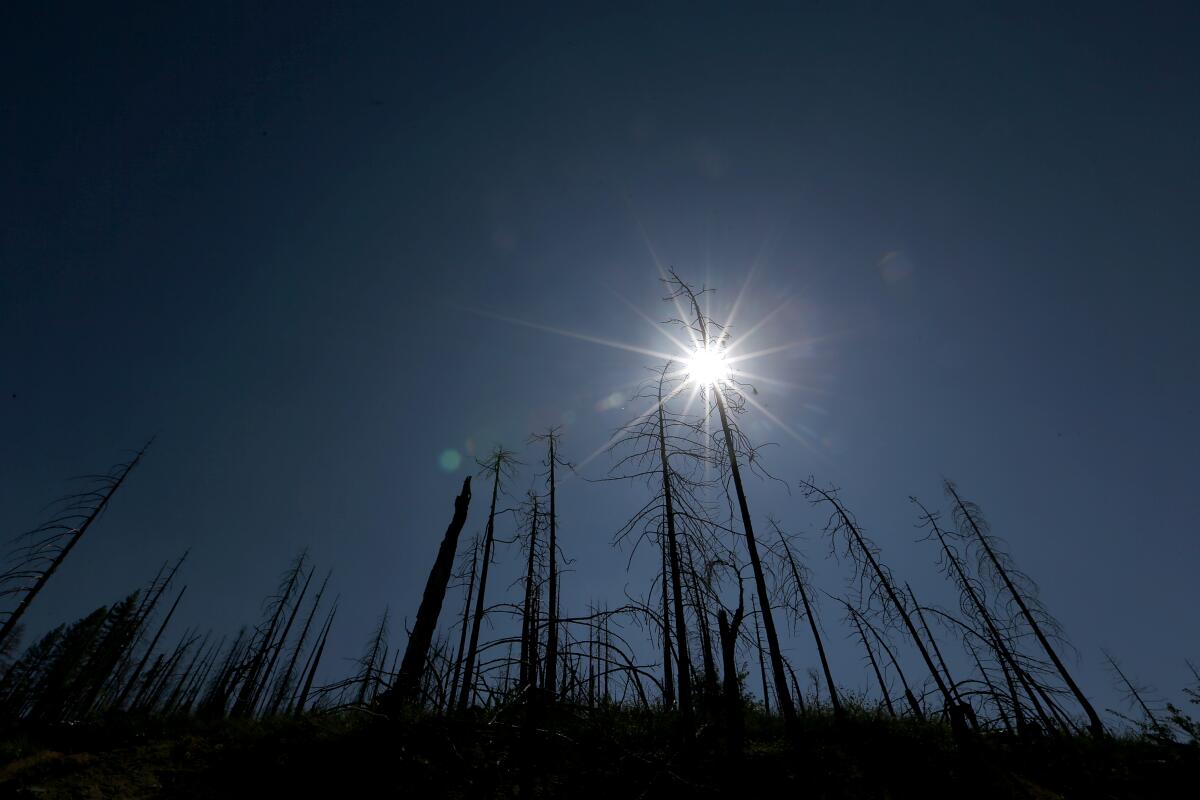
“This will not be the same Sierra our grandparents knew. But that doesn’t mean it won’t be a place that we continue to value and enjoy.” In a gut-wrenching story for the many Westerners who love to spend time in California’s Sierra Nevada range, my colleagues Alex Wigglesworth and Ian James report that climate change is already turning vast swaths of the mountains into “zombie forests” where trees are struggling to survive as temperatures rise and wildfires get worse. “Controlled burns” can help forests stay healthy and avoid more devastating blazes — but a recent controlled burn that nearly killed two beloved sequoias is sparking outrage, Alex reports in a separate story, threatening to derail support for this crucial but tricky practice.
California’s seven largest private landowners are all either tree-chopping lumber companies or water-gobbling farmers. That’s according to this analysis from the San Francisco Chronicle’s Christian Leonard and Emma Stiefel, which pegs Sierra Pacific Industries as by far the largest landowner. The list also includes Tejon Ranch Co. (which wants to build a sprawling residential and commercial development outside Los Angeles) and farming giant J.G. Boswell Co. (which has recently been accused of redirecting Central Valley floodwaters onto other farms). Speaking of large private landowners, I was also fascinated to read this story by the Nevada Independent’s Amy Alonzo about billionaire Los Angeles Rams owner Stan Kroenke trying to add 230,000 acres of federal land to a giant ranch he owns in Nevada, with speculation that solar development might be one of his aims.
California officials have delayed a vote on Pacific Gas & Electric’s $6-billion plan to bury many power lines, which would raise monthly electric bills by $40 for the average customer. The Public Utilities Commission’s vote is now scheduled for Nov. 16, KQED’s Kevin Start reports. The agency has also delayed until that date a vote on its controversial proposal to slash financial incentives for solar panels at apartment buildings, schools and farms. I wrote about that proposal last month.
POLITICAL CLIMATE
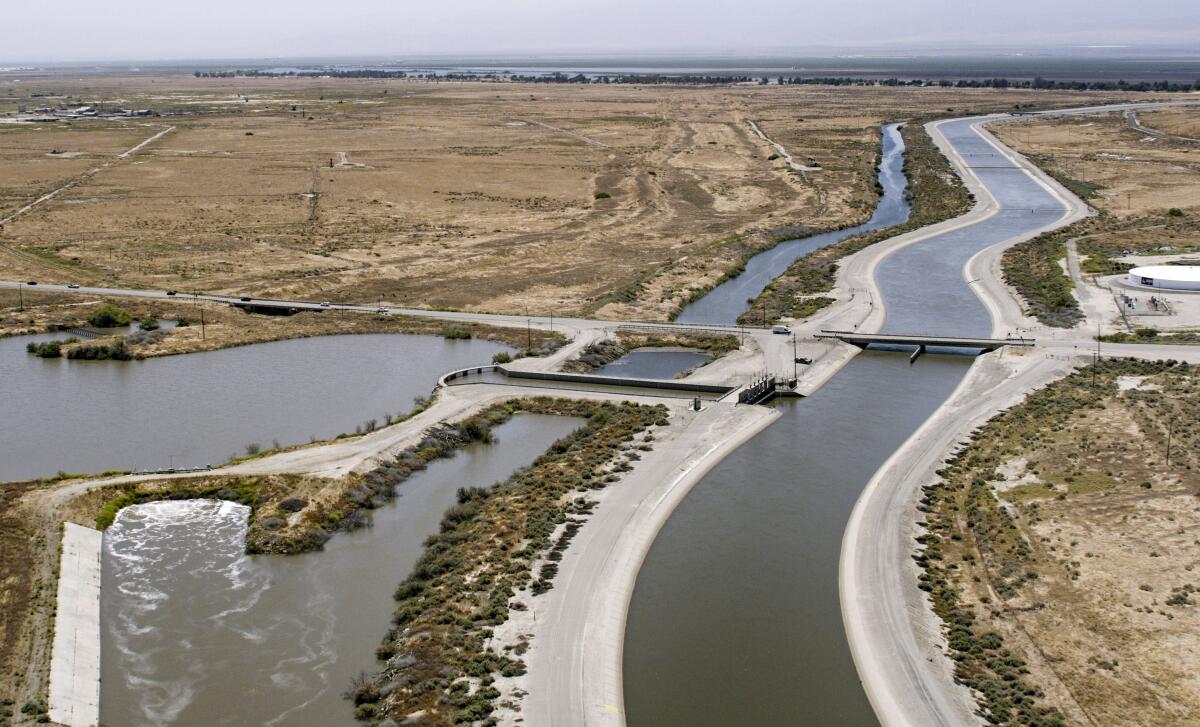
“It’s going to bring life to the Kern River, and that’s going to bring life to downtown Bakersfield.” A judge has handed a major victory to environmentalists and San Joaquin Valley residents looking to bring the Kern back to life for fish and for people, The Times’ Ian James reports, requiring the city to stop sucking so much water from the river (at least until a full trial can be held). In other good news for supporters of free-flowing, unimpeded waterways, Politico notes that the first of four dams being dismantled along the Klamath River, in the California-Oregon border region, has now come down.
The Biden administration has given California the green light to regulate climate pollution from trains. But big railroad companies are suing, arguing this is an interstate commerce issue that only the federal government is allowed to regulate, per the San Francisco Chronicle’s Bob Egelko. Along California’s Central Coast, meanwhile, ExxonMobil wants to repair a damaged pipeline and keep moving oil around — eight years after a massive spill, my colleague Grace Toohey reports.
New agreements between the United Auto Workers and America’s biggest car companies could result in greater benefits for workers from the manufacture of electric cars. Details here from Dan Gearino at Inside Climate News. In related news, 1 in 5 vehicles sold in California during the first nine months of this year were electric, Bloomberg’s Dana Hull reports.
THE ENERGY TRANSITION
Newly unearthed documents show how the U.S. gas industry used beloved chef Julia Child’s popular 1970s cooking show as a tool to further its campaign to promote gas stoves. Vox’s Rebecca Leber has the story, which also describes the American Gas Assn.’s work to fill TV shows and films with positive portrayals of gas stoves in the 1960s and 1970s. Back in the modern day, KQED’s Laura Klivans has a fabulous story about an Oakland block where low- and middle-income homeowners and renters have banded together to ditch gas and go all-electric. If you’re looking to save money on your electric bill and help the climate, Canary Media’s Alison F. Takemura explains how you can get a heat pump clothes dryer, and how the technology works.
The Biden administration is doling out $1.3 billion in loans to support construction of three major power lines, including two in the West, that don’t yet have buyers for the electricity they’ll transmit. Canary Media’s Jeff St. John wrote about how the funding will work. The Salt Lake Tribune’s Tim Fitzpatrick, meanwhile, wrote about one of the Western lines, which should help get solar power from California and Nevada to Utah, and wind power from Wyoming to other states. The Arizona Republic’s Sarah Lapidus wrote about the other Western line, which should move solar and wind power between New Mexico and Arizona.
The cancellation of two offshore wind projects on the East Coast doesn’t mean much for California’s efforts to prop up the industry. That’s according to this story by Politico’s Wes Venteicher and Camille von Kaenel, who write that offshore wind’s future in California is looking “stronger than ever” thanks to recent legislation passed by state lawmakers. But us Westerners should still care about what’s happening on the East Coast, at least if we want to deal with the climate crisis. Canary Media’s Jeff St. John has a great breakdown of the economic and political reckoning facing America’s nascent offshore wind industry.
AROUND THE WEST
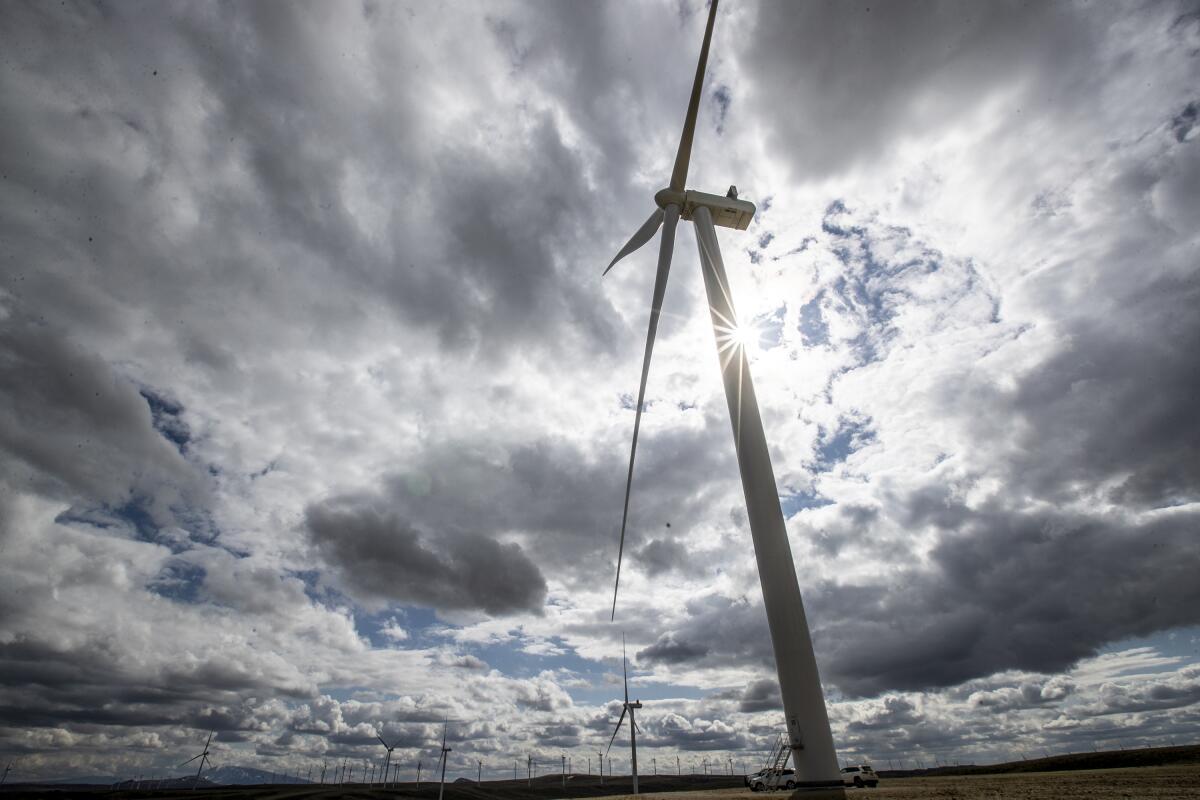
In the latest example of the challenges facing solar and wind developers across the West, Washington state residents are protesting plans for the state’s largest clean energy project ahead of Gov. Jay Inslee’s decision on whether to approve the combined solar and wind farm. Details here from Conrad Swanson at the Seattle Times — and yes, similar conflicts are playing out across the region, as I’ve been covering. In Oregon, meanwhile, Gov. Tina Kotek has come out in support of offshore wind — but with a request for more research on the environmental impacts, Oregon Public Broadcasting’’s Monica Samayoa reports.
Non-native deer are destroying the natural ecology and raising the risk of destructive fires on Catalina Island, a popular spot off the Southern California coast. But a plan to kill many of those deer is sparking fierce protest from many of the island’s residents, who love the animals despite the harm they’re causing, my colleague Louis Sahagún reports. Louis also wrote about a proposed development of tract homes and warehouses in Southern California’s Riverside County that conservationists say could spell doom for one of the oldest living organisms on Earth, a Palmer’s oak tree thought to be at least 13,000 years old.
It’s official: no more birds named after racists. In a surprise move, the American Ornithological Society has responded to calls to choose new monikers for dozens of birds currently named for enslavers and others who espoused racist ideas, the Washington Post’s Darryl Fears reports. It’s part of a broader push by the society to replace all bird names that honor people — mostly white men — with monikers “that better describe [the birds’] plumage and other characteristics,” Fears writes.
ONE MORE THING
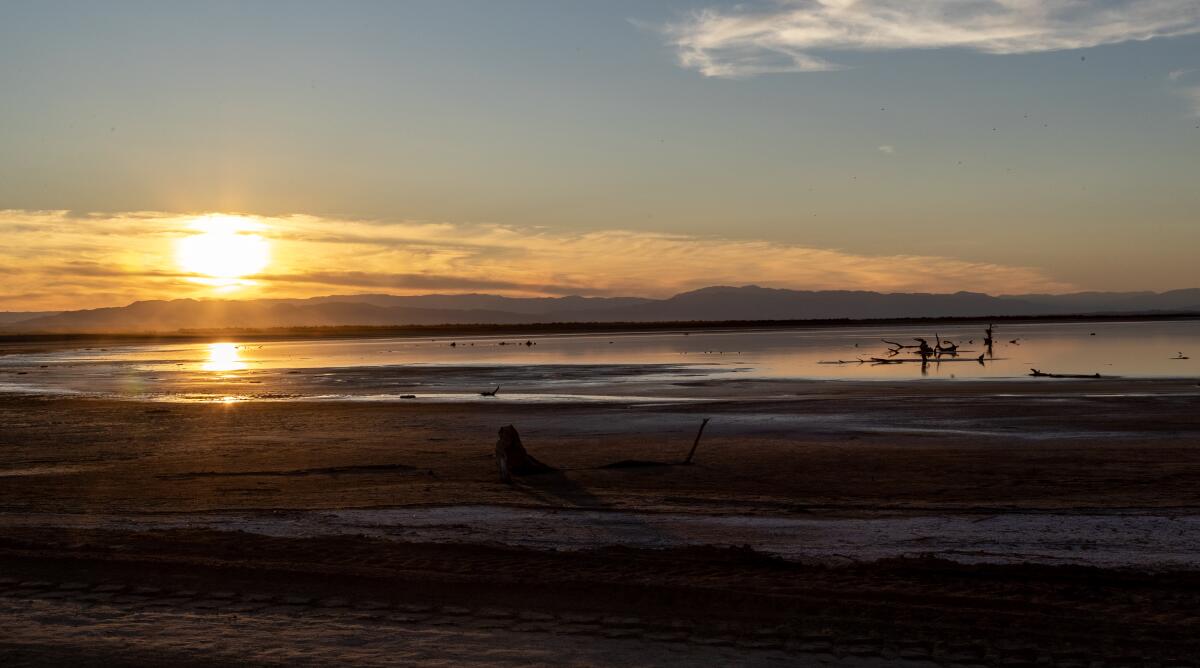
I’ve written a lot over the years about the Salton Sea, a once-thriving lake in the Southern California desert that has fallen on hard times. Long sustained by irrigation runoff from nearby farms, the lake has been shrinking as Imperial Valley farmers sell Colorado River water to cities along the coast. The result has been dying fish, diminished habitat for migratory birds, and toxic dust wafting up from the exposed shoreline, polluting the air breathed by low-income, largely Latino communities.
So it’s encouraging to read about renewed momentum for restoration projects, as reported by the Desert Sun’s Erin Rode. But at the same time, the latest progress is woefully inadequate. Six years ago — after more than a decade of delay — state officials set a target of 30,000 acres of habitat and dust suppression by 2028. Rode reports that just 368 acres have been completed.
That’s pitiful. Everyone involved needs to move faster.
This story is the latest edition of Boiling Point, an email newsletter about climate change and the environment in California and the American West. You can sign up for Boiling Point here. And for more climate and environment news, follow @Sammy_Roth on Twitter.




